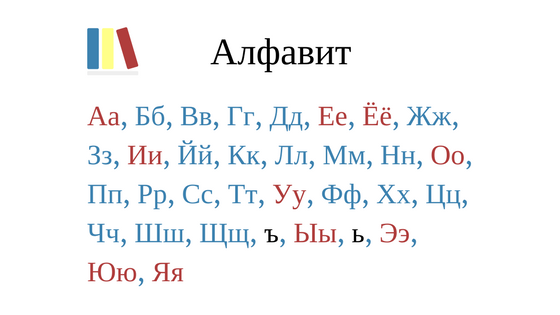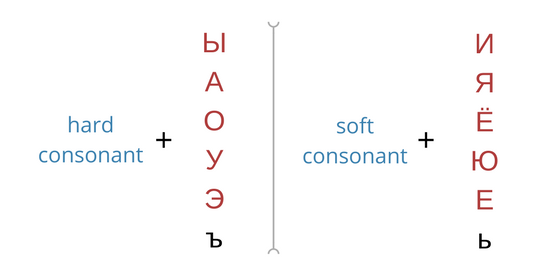What letters and sounds are there in Russian? How can those letters sound? What is the difference between hard and soft consonants? When is a consonant hard and when is it soft? What for do we need the soft (ь) and hard (ъ) signs?
Keep reading to get the answers to all these questions!

Letters and sounds
Below, you will find an interactive Russian alphabet with audio. I put the sounds for each letter [in the square brackets], providing one or two examples of words with it.
And most probably, you will have two questions from the very beginning here.
#1 Why do some letters have two sounds?
It is the specific feature of the Russian language. Most consonants can be either soft or hard in Russian. With this in mind, I chose two examples for each of these letters to demonstrate both hard and soft variants.
#2 Why do «ь» and «ъ» have no sounds?
These are soft and hard signs. They do not represent any sound themselves but affect the previous consonant: it will be soft before «ь» (the soft sign) and will be hard before «ъ» (the hard sign).
Sometimes, we also need to separate a consonant from a vowel in a word. To do it we will put one of these signs between them. This way, for example, we can distinguish such words as «семя» [s′ém′ʌ] и «семья» [s′im′jʌ́] (a seed and a family).
And now try to pay attention to these features, while listening to the audios.






















Hard or soft?
But how do we know, whether the consonant is hard or soft when reading?
Easily! All you need is to check the next letter.
- The consonant is hard before the hard sign (ъ), other consonants, or the vowels – а, о, у, э, ы.
- The consonant is soft before the soft sign (ь) or the vowels – я, ё, ю, е, и.
However, ш, ж, and ц are hard, while ч and щ are soft in Russian. Always, not depending on the next letter.
And why does the consonant become soft when followed by Я, Ё, Ю, or Е?
The thing is that these vowels consist of two sounds: я = [йа]; ё = [йо]; ю = [йу]; е = [йэ].
With this in mind, let’s have a look, what happens when we add such a vowel to a consonant. As an example, consider the syllable дя:
дя = д+й+а = дй+а = д′+а
So, it is all because of this [й]-component, that makes the previous consonant sound soft.
Practice
And finally, let’s move from theory to practice! Try to read these words. Can you guess, what do they mean?
Анана́с, ва́за, бана́н, гита́ра, раке́та, луна́, ма́ма, па́па, приве́т, му́зыка, матрёшка, ша́пка, ла́мпа, кино́, ко́фе, чай, лимо́н, стул, суббо́та, до́ллар, ру́бль, Ита́лия, Аме́рика, Испа́ния.
So, did you cope with the words? Did you understand them? (You can check yourself with audio here).













